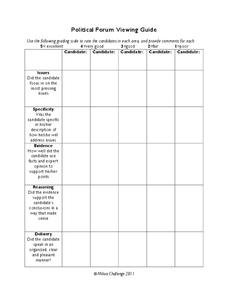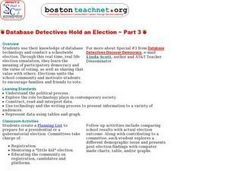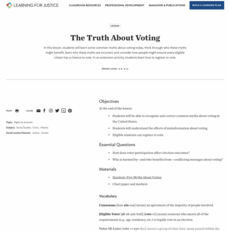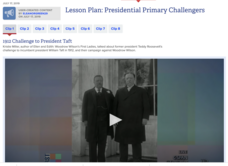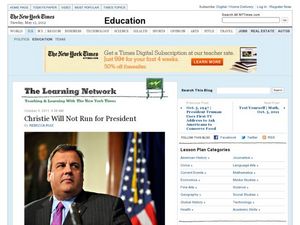Curated OER
Results In On Mock Election
Students examine the two presidential candidates in 2000, and identify their own stance on campaign issues. They create fictional candidates that represent their beliefs, and write campaign speeches from their point of view.
C-SPAN
The Impact of Citizens United v. FEC
What began as an effort to show a movie by an interest group has impacted financing of federal elections. Did the Citizens United case lead to more "dark money" in politics, or did it shine a light with more speech? Using video clips...
Museum of the Moving Image
Political Ads in Historical Context
Campaign ads target both timely issues and general themes. Presidential campaign ads from 1952 and 1988 provide class members an opportunity to compare how the topics ads choose to address can dramatically influence election outcomes.
School Improvement in Maryland
Evaluating Political Advertisements
How do interest groups try to influence elections? As part of their study of the election process, groups view 30-second advertisements produced by advocacy groups and use the provided worksheet to evaluate these ads. They then craft...
Mikva Challenge
Political Forum Viewing Guide
Is there a way to determine a winner of a political debate? Use a helpful rubric to evaluate the issues, specificity, evidence, reasoning, and delivery of candidates in a debate. After assessing each person's performance, high schoolers...
Partnership for Public Service
Presidential Transition Guide
How do two administrations work together to craft a seamless transition of power? Learn more about personnel management, policy implementation, and the role of an outgoing president with a transition plan designed for the 2012...
Curated OER
Social Studies: Campaign Finance Reform
Students develop arguments for and against campaign finance reform, examine federal and state laws that attempt to limit contributions to political candidates, evaluate various plans for campaign finance reform and formulate their own...
Curated OER
Ch. 1 Practice Exam
In this elections worksheet, students match 5 methods of counting votes for candidates to their descriptions. Students match 4 different types of fair candidates with their descriptions. Students problem solve 7 election scenarios.
Curated OER
Growing Voters and Election 2004: Classroom Debate
Young scholars research the issues and platforms of candidates and separate propaganda from process in order to choose a candidate to support. Students examine political parties and their contributions to shaping the foundation of the...
Curated OER
The Campaign: Issues and Strategies. Campaign Press Coverage
Pupils discuss and fill out worksheets on the amount and type of press coverage given to certain candidates. In this press coverage lesson plan, students complete 4 worksheets and view maps of the United States to see where the press...
Curated OER
2002 City of Newark Mayoral Campaign
Students research community issues and develop a consensus of issues they think the next mayor should address and study the candidates' positions they have chosen to track.
Curated OER
Building a Class Government Through Elections
Young scholars participate in their own classroom election to fill multiple positions. Individually, they examine campaign speeches and write their own. Once the election occurs, they must fulfill their duties as outlined in their...
Curated OER
Presidential Election 2004: Analyzing the Attack Ads
Students view and text the text of presidential election advertisements in 2004. Using the ads, they analyze them and check the validity of the statements made. They answer discuss questions for each ad and share them with the class.
Curated OER
Database Detectives Hold an Election ~ Part 3
Students use a database to conduct a schoolwide election. They discover the importance of voting and democracy. They incourage one another to vote.
Curated OER
Evaluation of Election Process
Students examine the procedures to elect the President of the United States. In groups, they create their own political cartoon presenting a consensus of their point of views on the process. They identify the strengths and weaknesses...
Curated OER
Follow the Campaign Trail
Students choose a candidate of interest to them to follow throughout a campaign. Using the Internet, they identify the strengths and weaknesses of their candidate and compare them to the others. They share their findings with the class.
Curated OER
Cartoons for the Classroom: 2004 Presidential Election
In this current events activity, students analyze a political cartoon about the 2004 election and respond to 5 short answer questions.
Curated OER
Cartoons for the Classroom: Campaign Echoes
In this current events worksheet, students analyze a political cartoon about the 2008 Presidential campaign and respond to 3 talking point questions.
Teaching Tolerance
The Truth About Voting
True or False: Only Presidential elections matter. Academics delve into common voting myths to understand what is true and why the election process is critical to democracy. The lesson uses group discussion, activities, and handouts to...
Smithsonian Institution
The American Presidency: Grades 4-6
An interesting unit explains the American presidency from the campaign trail all the way to the role of the president. Historians participate in discussions, create posters, conduct Internet research, and more to gain an understanding of...
Encyclopedia Britannica
Political Issue Timeline
As part of a study of US Presidential elections, class members track the history of an issue in the 2020 campaign. They create a timeline to determine if there are any patterns, if ideas about the issue have evolved, or if in issue is no...
C-SPAN
Presidential Primary Challengers
A formidable opponent can shake up the election of an incumbent president. Class members explore the results of the elections of 1912, 1968, 1976, 1980 and 1992 using video clips. A chart helps pupils organize their thoughts and analysis.
Encyclopedia Britannica
Electoral College Philosophical Chairs Debate
Because of the Electoral College, it is possible to win the popular vote in a US Presidential election and still lose the election. After researching the pros and cons of the Electoral College, class members engage in a structured debate...
Curated OER
Christie Will Not Run for President
Readers answer eight who, what, when, why, and where questions as they read this New York Times article. They peruse the article to learn about Chris Christie and the 2012 presidential race. Next, they answer the related comprehension...






